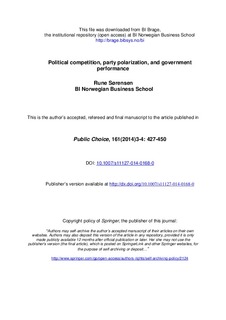Political competition, party polarization, and government performance
Journal article, Peer reviewed
Permanent lenke
http://hdl.handle.net/11250/277811Utgivelsesdato
2014Metadata
Vis full innførselSamlinger
- Publikasjoner fra CRIStin - BI [1015]
- Scientific articles [2181]
Sammendrag
Lack of party competition may impair government efficiency. If the voters are ideologically predisposed to cast their vote in favor of one political party, they may reelect an underperforming incumbent. Party polarization may augment this effect since the median voter faces a higher cost of selecting a better, but ideologically distant incumbent. Alternatively, if the electorate is evenly divided between parties, polarization may induce parties to apply greater effort to improve their election prospects.
The current paper analyzes efficiency in Norwegian local government. Efficiency has been measured by means of panel data on government service output over a ten-year period. Electoral dominance has been measured as number of elections where one party bloc receives at least 60 percent of the votes, measured over six consecutive elections. Party polarization is defined as the ideological distance between the two party blocs, and it is measured on basis of survey data on the ideological preferences of elected politicians. Lack of party competition reduces cost efficiency, the effect being stronger in governments where party polarization is large. These agency losses are greater in high-revenue municipalities.
Beskrivelse
This is the author’s accepted, refereed and final manuscript to the article
